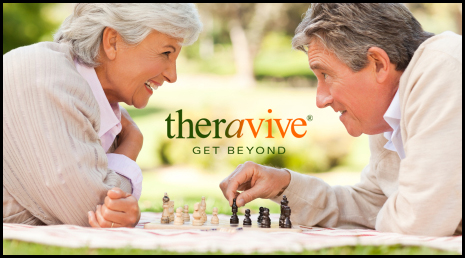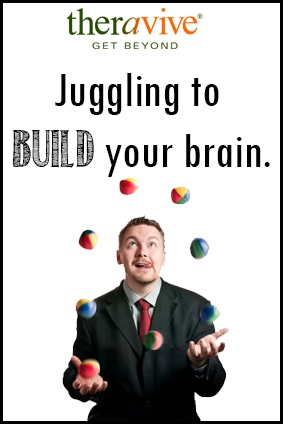 Brain Building
Brain Building
You see them at the park. It is a nice, sunny day. There are about ten people standing around each other and they are...juggling? Balls, pins, hoops… You sip your coffee and watch them. How odd, you think, to spend the afternoon with a group of people juggling. Yet they seem so contented. Do they know something you don’t?
It has long been understood that there is a relationship between brain matter and brain function, as the brain’s physicality is directly affected by physical and mental behaviors. Brain plasticity is the brain’s ability to change chemically, physically and functionally. There have been great strides in observing the brain’s plasticity through the use of magnetic brain imaging (MRI) and other imaging techniques. These technologies allow scientists to study just how certain activities grow the brain. As it turns out, the brain’s willingness to learn is quite remarkable. [1]
What are some brain-building activities that you can enjoy that are fun and inexpensive?
Chess - it’s not just for kings
While there are mixed results from studies questioning whether or not chess will improve school performance or intelligence, findings demonstrate that both hemispheres in the brains of chess experts are activated simultaneously while playing chess. This does not happen with novice chess players, as only their left hemispheres are activated during chess playing activity. These findings strongly suggesting that chess - and other learned areas of expertise - trains the brain to be more efficient. [2]
In addition, research is beginning to shed light on the possibility that there is a certain part of the brain involved in making judgement calls because this area of the brain “lights up” when one is engaged in the check-mate moment of chess. [3]
No, playing chess will likely not make you smarter, but there are other positives to playing chess such as confidence and independence development. Plus, chess is a great way to be social, especially for those people in environments where socializing and brain building are exceptionally important such as in nursing homes or mental health institutions.
 Juggling - it’s not just for clowns
Juggling - it’s not just for clowns
That group of people you saw juggling in the park the other day? Turns out they’re not so weird. Actually, they are on to something.
Juggling has had known benefits for thousands of years. An ancient drawing found in Egypt depicts a group of women juggling together, each with two or three balls in the air. A complex motor skill task, juggling has been shown to increase density in grey brain matter in the regions associated with visuomotor coordination. It also increases white matter in the brain, that is, the pathways that transmit signals from one area of the brain to another. [1]
The great thing about the brain is that grey matter density can increase even in the elderly, so juggling is a great way for the aged to keep their brains sharp. Elderly jugglers may not reach the same level of ability as younger jugglers, nor will the grey matter increase as much, but studies have repeatedly shown that any complex whole-body task and acquirement of highly abstract information is essential for brain growth. [4]
Perhaps every normal person should learn to juggle. Or at least try. It worked for the ancient Egyptians, afterall.
Tree climbing - it’s not just for squirrels
Do you want to relieve stress? Climb a tree! So beneficial to the mind is tree climbing that there now exist tree-climbing therapy social groups. Studies have shown that outdoor activities and connecting with nature are beneficial to the psychology of the mind. There is something special about interacting with a living object.
In tree climbing test subjects, the sympathetic nervous system was activated while the subject was engaged in tree climbing, which is the system that regulates the fight or flight response to a stress. However, after climbing the tree, the parasympathetic nervous system was activated. That is to say, the body returned to a state of relaxation after tree-climbing. The parasympathetic nervous system ought to kick-in after a stress to main a healthy balance of hormones in the body. Also reported were feelings of relaxation, vitality, and diminished confusion and fatigue after climbing a tree.
This does not mean that you should just climb anything, however. Tower climbing has been associated with high levels of stress and anxiety, nor did the parasympathetic nervous system engage after climbing a tower in test subjects. [5]
In addition to these remarkable findings, those who participated in tree-climbing therapy also reported having a greater appreciation for nature and the environment. [6] What’s not to love about trees?
There are many great activities you can engage in every day to trigger the loop between brain matter and brain behavior. Even until old age, the brain is willing to learn new things if you are.
_______________________________________________________________________________________________________
[1] [“Plasticity in Gray and White - Neuroimaging changes in brain structure during learning”, R.J. ZatorreR.D. Fields and H. Johansen-Berg. 2012 http://www.ncbi.nlm.nih.gov/pmc/articles/PMC3660656/]
[2] [“It Takes Two–Skilled Recognition of Objects Engages Lateral Areas in Both Hemispheres”, Merim Bilalić, Andrea Kiesel, Carsten Pohl, Michael Erb, Wolfgang Grodd. 2010. http://www.plosone.org/article/info%3Adoi%2F10.1371%2Fjournal.pone.0016202]
[3] [“Chess Playing Helps Reveal How Brain Works” http://www.ninds.nih.gov/news_and_events/news_articles/pressrelease_chess.htm]
[4] [“Training-Induced Brain Structure Changes in the Elderly”, Janina Boyke, Joenna Driemeyer, Christian Gaser, Christian Buchel, and Arne May. 2008 http://www.jneurosci.org/content/28/28/7031.full.pdf+html]
[5] [“ Comparison of the physiological and psychological benefits of tree and tower climbing” John Gathrighta,, Yozo Yamadaa, Miyako Moritab. 2006 http://www.treeclimbing.net/Portals/3/Documents/John_Gathright_Comparison_Tree_Climbing_Tower_1st_Paper.pdf]
[6] [“ Tree-Assisted Therapy: Therapeutic and Societal Benefits from Purpose-Specific Technical Recreational Tree-Climbing Programs John Gathright, Yozo Yamada, and Miyako Morita. 2008 http://joa.isa-arbor.com/request.asp?JournalID=1&ArticleID=3058&Type=2]
Christie Hunter is registered clinical counselor in British Columbia and co-founder of Theravive. She is a certified management accountant. She has a masters of arts in counseling psychology from Liberty University with specialty in marriage and family and a post-graduate specialty in trauma resolution. In 2007 she started Theravive with her husband in order to help make mental health care easily attainable and nonthreatening. She has a passion for gifted children and their education. You can reach Christie at 360-350-8627 or write her at christie - at - theravive.com.